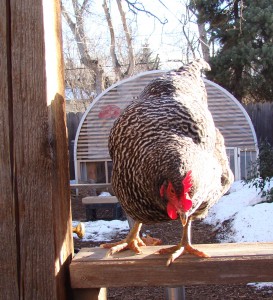“’Where’s André?”
“Out in the garage, sharpening his knives.”
We begin walking towards one of the outbuildings when the farmhands yell out “No, not there, the garage!”
We are oblivious urban dwellers who can’t tell the difference between a farm outbuilding and a farm garage. Nor do we fully yet grasp the full implication of raising backyard chickens.
We came to Jacob’s Spring Farm with our nine hens. They stopped laying a few weeks ago, a combination of age, time of year, and breed characteristics. Our backyard experiment is a cooperative model, we share the birds with six other neighborhood households. The idea has many benefits having to do with cost, labor, and ease. But since they stopped laying, the primary boon of weekly eggs from our shared flock was gone.
We’ve been keeping hens for four years now. We know that a hen’s egg laying capacity is optimum for only about a year. Our first set of retired chickens went to a coop in unincorporated Boulder County. The guy who took them just likes having birds around, he wasn’t into the eggs. Our second batch went to the daycare center down the street where they lived out their later lives among children and mostly died of natural causes. With this batch, we decided to confront the lingering question of sustainability.
If eggs are the goal, how do we maintain a flock year after year that produces acceptable results?
Which brings us back to why we came to André’s with our nine hens. As a livestock farmer he is necessarily in the business of butchering. He was willing, for a small fee, to take our hens.
It’s a sad reality. Those of us who equate keeping an animal with having a pet have a hard time with letting go of livestock. But “the local food movement and food sustainability” when manifested in backyard hens means that we urban dwellers become livestock farmers and need to own the full-cycle that that implies.
In the spring, we hope to raise some chicks. The cycle will begin again.



